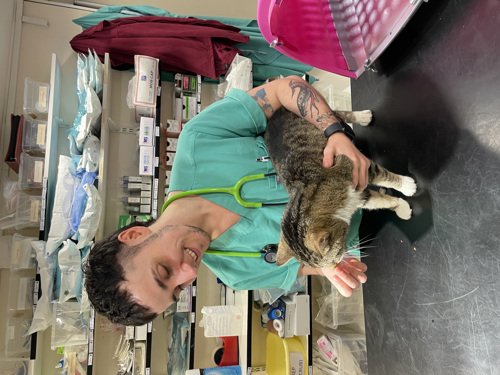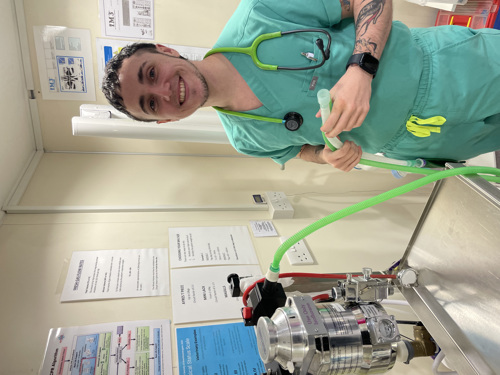 Commuting time can give you the chance to prepare yourself for work.
Commuting time can give you the chance to prepare yourself for work.
For apprentice Veterinary Nurse Luke Palmer, that adjustment has to be fast - he lives above his.
Midland Veterinary Surgery in fact, a stone's throw from the iconic Angel building in North London. "When the opportunity presented itself, I took it," he says. 'It's so hard to get on to the housing ladder, especially in the capital."
Already armed with a degree in Animal Behaviour, Luke, 30, is in the second year of his Level 3 Apprenticeship.
"I was always interested in veterinary surgery”, he reveals, "and started work at a petcare retail outlet, aged 21, to enter the sector." His year there was not everything he had expected, however. "I became disillusioned with the work - there was no sense of a team dynamic” and spent five years away before returning in 2020 as a Veterinary Care Assistant at the Surgery.
After his year of doing everything ranging from manning reception and cleaning to helping the five vets, under the supervision of a qualified nurse, the practice entered Luke for his Apprenticeship at City & Islington College, starting September 2021.
Now in year two, Luke is involved in the daily tasks of pet care. "I can monitor anaesthetics and help remove lumps under the direct supervision of a veterinary surgeon, as long as these are not inside the body cavity," he explains.
Covering "the basics" in year one at his 9am-7pm Tuesday day release, Luke learned about parasites and infectious diseases, plus health and safety and legal issues surrounding veterinary practice.
"We've moved to X-rays, medicines, dispensing drugs and urinary systems of dogs, cats and rabbits this year," he says, "along with respiratory and digestive systems, with a whole section on pain management."
Tests at the end of each unit help Luke identify points to strengthen, with a two-hour year-end exam to follow online in college "I like the exam situation," he says. “Short answers are more difficult because you have to be concise with what you put down, like using the correct terminology."
With his grounding in Animal Behaviour, Luke has a head start in knowing how to handle the Surgery's patients. "My parents had cats, so I grew up with them in the house," he notes. "They are easier to read than dogs, but you have to remain vigilant because they are in an unfamiliar place when they come in, so you have to expect the unexpected."
Nowhere is that truer than outdoors in the wild, where Luke's role model, Steve Irwin, was killed by a stingray while filming. "He was my idol - the way he would handle dangerous animals like crocodiles was incredible. I was so saddened when I heard how he'd died.
"My dream job would be working with exotic animals," he adds. "I'd love to do nursing in different countries, treating wildlife or animals in zoos."
Meanwhile, he's enjoying the journey there. "The best bit for me is dealing with clients who really care about veterinary advice. They listen to you and respond. It's really rewarding when they thank you or seek more advice.
"Owners often don't know what we can and cannot do for patients or for them. We run one-two hour nurse clinics mornings or afternoons that cover preventive medicine and where they can get the best advice. They help us work in tune with owners and vice versa.
"We have to manage expectations. Surgeries have little or no time to answer all the questions that owners ask as the daily stuff is geared to patients. If they want free advice, we direct them to our clinics."
Those questions are set to increase as the range of breeds coming into the practice continues to grow. "Breeds follow specific trends," he says, "usually from popular culture or media influence. French bulldogs are popular now, as are British short-haired cats. A couple of dwarf rabbits are regular patients too."
Conversations can be troublesome, he adds. "They are difficult sometimes. As a private clinic, with no government funding, talk can turn to money and whether owners can afford to pay for treatments. If they can't, we may have to euthanise.
"Owners can get very emotional if emergency treatment or first aid is necessary. We have no CT or MRI scanners so if clients can pay for scans, we refer them to a specialist surgeon at the local veterinary hospital.
"Pet insurance is certainly on the increase," Luke continues, "but Veterinary Council guidelines do not allow us to sell it."
Bereavement affects vets as well as owners, Luke also explains. "It was covered in the first year of my course but there is a confidential reach out counselling service available for nursing staff and receptionists to help them talk about issues. Vets and nurses also hold a monthly catchup meeting as there isn't always time to talk."

Luke likes to bond with fellow course trainees - something he looks forward to. "As the oldest in my class of ten, I chat mainly with those with the most life experience, but everyone is lovely - ages range from 20, to me at 30 and it's a nice mix.
"My course provides the theory to allow me to do my job better. At work, I do things and know why I'm doing them. They place the veterinary practice into context."
Qualifying as a veterinary nurse is only the start, Luke says. "We're training forever really. CPD [Continuing Professional Development] will help me keep up to date and be a better nurse.
"Nursing on its own is completely valid - a great career. Veterinary Nursing offers you plenty of different career avenues in different specialties, whether in a big hospital or a smaller practice like ours."
Back to that micro commute. Is there time enough to transition from home to work? "Living above the practice is teaching me how to shut off from work. I had the chance to decompress when I lived in a house elsewhere.
"It's tough to balance that now but it's getting better. It was my choice after all. I'm the night watchman I suppose and will go downstairs to investigate if I hear dogs barking - although we tend not to have stopovers." His cat Tilly gives him a sense of home though, he says.
To chill, Luke always finds time to take in a workout. "The gym's just next door. I go in the morning usually, as my hours are 11am to 7pm," he explains. "The job can be taxing on your body as you may be in a strange position when you are holding an animal or lifting a 60kg dog. I run too. My pastimes I do by myself. I like my own company."
"I'm no Dr Doolittle but I try to understand animals on their own terms by reading their body language," he concludes. But you feel that if Luke could talk to the animals, he certainly would do.
My job in three words: "Demanding, rewarding, enriching”.


